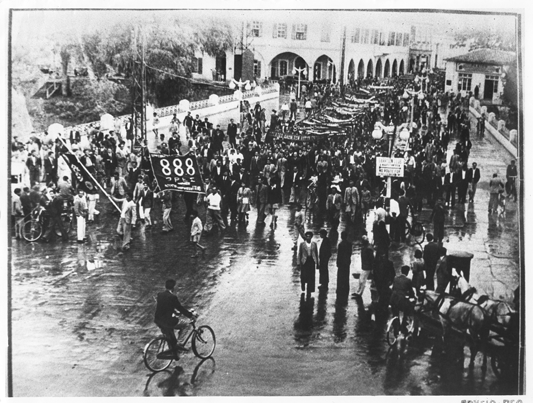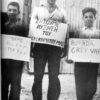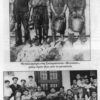
Anti-colonial struggle and social struggles
In Cyprus two centres of liberation struggle had been formed. The Right and the ruling class came together around the Ethnarchy headed by every Archbishop of the time. The working people and the progressive elements of bourgeois class allied themselves around AKEL. The Ethnarchy wavered between the framework of so-called greek-british friendship and the need for struggle against the British. Ideologically the right and the Ethnarchy were characterized by extreme nationalism and fanatical anti-communism, which was being strengthened by the civil war and post-civil war climate in Greece. The Right and Ethnarchy rejected without any discussion the idea of a united front struggle of our people, they strove to monopolize the struggle and cultivated division. The confrontation between Right and Left was especially intense during the elections for the election of mayors and local councilors. In these elections the Left had great successes.
The Left viewed the struggle of the Cypriot people as being united with the general anti-colonialist, anti-imperialist struggle of the peoples which was developing those years. AKEL combined the struggle for freedom with the struggle for democratic gains. It rejected nationalism-chauvinism which led to confrontation with the Turkish Cypriots. It remained steadfast on the position for unity in action of all the anti-colonial forces on a democratic basis of cooperation and mutual respect.
AKEL and the Left never wanted to monopolize the anti-colonial struggle, nor did it question the patriotism of any political force. The split in the forces of the people is due to the policy which the leadership of the Right followed. This division objectively helped the British colonialists and weakened the freedom struggle of the people of Cyprus.
AKEL did not hesitate to call for a regime of self-government as a temporary stage for self-determination. However it withdrew from the Consultative Assembly (Diaskeptiki) when it came to the conclusion that the English did not have a sincere desire to move forward to a regime of real self-government. AKEL respecting the feeling of the great majority of the people and promoting the demand for self-determination took initiatives and energetically worked for the 1950 referendum. At the same time however it reached out to the Turkish Cypriots reaffirming them that AKEL would always defend in every way their own interests also.
AKEL correctly evaluated that by taking into account the conditions and realities of Cyprus the proper form of struggle was that of mass political struggle. Within the framework of this approach it continuously mobilized the people through demonstrations, rallies, political strikes and other forms of mobilizations. It took initiatives on the internal front as well as on the front of internationalization of the Cyprus question. The Cyprus problem was for the first time put before the United Nations in 1949 through a memorandum of the Left to the Security Council and the General Assembly which had the following characteristic title: We condemn Britain. Internationalization was also promoted by the sending abroad of delegations of the Popular Movement.
The decade of 1945-1955 was not only a period of intense political struggles and development of the anti-colonial fight. At the same time it was also a decade of intense class struggle. Even during World War II we saw great mobilizations of working people as was the struggle of the 1st of March 1944 for the cost of living adjustment (COLA). In the years after 1945 and until independence AKEL and the Pancyprian Federation of Labour (PEO) won the inalienable right to organize working people and the foundations were laid for the attainment of most of the socio-economic gains which the Cypriot working people enjoy today.
The climax of these struggles was the great strikes of miners, metalworkers and construction workers of 1948. These strikes were special and without precedent in intensity, duration and heroism but also through great sacrifice. The working class with the support of the vast majority of our people in 1948 waged a great class struggle and won, despite the fact that foreign and local reaction, the colonial government, the leadership of the Church and the then strike-breaking leadership of SEK (the Right-wing Union) formed an alliance against it. The great class struggle of 1948, as well as others before and after, was waged together and in brotherhood by Greek Cypriot and Turkish Cypriot workers, thus forming the friendship and cooperation of the two communities. 1948 remains a bright landmark in the social struggles of the Cypriot working people.
The anti-colonial struggle reaches its peak – Years of hardship
In 1955 the leadership of the Right by aiming at a drastic move to take the whole initiative of movements of the struggle in its hands and to try and isolate the Left, turns towards the wrong, as far as the conditions of Cyprus are concerned, form of armed struggle. In addition, the mistake is also made of assigning the military leadership of the armed struggle to Georgios Grivas, a man with fascist views, a declared anti-communist and chauvinist. A man without political virtues and capabilities. Despite the heroism and self-sacrifice which members and cadres of EOKA showed, the armed struggle led the Cyprus question into dangerous impasses. Deadlocks which British imperialism exploited in order to impose a solution which served their own interests.
AKEL disagreed with the tactic of armed struggle and predicted that only harm will it cause to the Cyprus struggle. AKEL stood its ground with resoluteness and consistency in favour of mass-political struggle and the need for the participation of the whole of the people with its forces united in this struggle. Due to this position AKEL and AKEL members were abused, slandered, condemned for treason. They did not however lose their way. Nor did they give in. They continued to struggle even in the most difficult conditions for the removal of the colonial yoke holding always aloft the banner of unity.
The turn of events and the outcome of the struggle vindicated AKEL. Today many people who are not on the Left including researchers, historians and politicians acknowledge that the choice of the armed struggle was a mistake.
On the 14th of December 1955 the British exploiting the volatile situation which had been created found the opportunity which they had been looking for many years to destroy AKEL. The Party of the working people and a whole number of the organisations of the Left were banned and made illegal. They banned the publication of newspapers and other publications of the Party. They arrested and threw into prison and concentration camps 135 cadres of AKEL and the Left. Through these actions the British colonialists wanted to crush AKEL, the most consistent, thus also the most dangerous for them anti-colonial and anti-imperialist force.
However AKEL was deeply rooted in the heart and consciousness of the Cypriot people and thats why the British failed in their aims. AKEL members who managed to evade arrest together with cadres who later managed to escape including amongst them the General Secretary Ezekias Papaioannou reorganized the Party quickly in conditions of illegality and continued with great intensity, resolve and decisiveness the anti-colonial struggle. In this struggle Andreas Georgiou and Argyros Nicola, members of AKEL, gave their lives. AKEL was banned by the colonialists until the 1st of December 1959, that is ten months after the signing of the London-Zurich Agreements. Their intention was to continue the banning of the Party also after independence. The pressure however of the people and the huge rallies in favour of the legalization of AKEL forced them to retreat.
During the four years from 1955 to 1959 the anti-communist frenzy of Grivas and his plans for the imposition of the complete rule of the right led Cyprus to the edge of civil war. Cadres of the Left were being murdered cowardly on the orders of Grivas accused unjustly of treason. The killing provoked a popular upheaval. Civil war in such a critical time in Cyprus history was avoided thanks to the patriotic stand taken by AKEL. The Party answered the provocation not by the same way but by popular mobilizations condemning the killings and the policy of division. The intervention of Makarios against the murders of Left people also played its own positive role. The Left comrades murdered in the 1955-1959 period are heroes and martyrs of the Popular Movement, are heroes and martyrs of Cyprus freedom. In the consciousness of the people their memory is vindicated. AKEL together with the Association of Relatives murdered for their political Beliefs in the period 1955-1959 are fighting for the vindication of the memory of the victims of the terrorism of Grivas also by the institutional organs of Cypriot society.
At the same time in the first years of independence the fascist terrorist Turkish Cypriot organization TMT headed by Denktash carried out killings and persecution of progressive Turkish Cypriots trying to crush the Left inside the Turkish Cypriot community. The murders and terrorism did not manage to damage the ties of the Left with the Turkish Cypriot community, which were built on strong foundations of common struggles.
Neither the suppression and the special measures of the British, nor the terrorism of Grivas managed to crash AKEL. After four years of illegality and repression the Party came out of the period of hardship even more stronger, even more larger with close links with the people and the working people.





